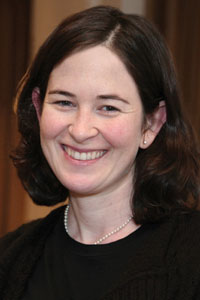Member Article
More Than Just a Grade

Rebecca Silton
After reading Mahzarin Banaji’s (2011) article in the Observer calling APS members to action, I was sold on using the APS Wikipedia Initiative (APSWI) as a classroom tool. It was just a matter of waiting until the right course came along.
When I was scheduled to teach a graduate class in clinical neuropsychology this past fall semester, I decided it was the perfect course to try out APSWI because I always strive to include a community outreach component in the courses that I teach. The mission of APSWI provided a great vehicle for promoting social justice, particularly within the context of a Neuropsychology course. As medical paternalism is gradually being replaced by do-it-yourself internet research, providing accurate cutting-edge information about neuropsychological research and related diagnoses to an internet audience is necessary for individuals to make informed decisions about their medical care. Wikipedia is frequently accessed for health-related information, including information about neuropsychological and psychological diagnoses. By joining the ranks of professors and students who were already participating in APSWI, I was excited to provide my students with an opportunity to contribute to this important group effort. Rather than assign the traditional final paper that would ultimately get buried six bytes under on a hard drive and never see the light of day as a published manuscript, I assigned “Project NeuroWiki” and invited my students to learn a little syntax and travel into unchartered web territory with me.
Overall, Project NeuroWiki was a very rewarding experience for me and my students. I am extremely proud of my students’ hard work, reflecting their intrinsic motivation to improve their selected Wikipedia pages (to the right, see the anonymous feedback provided by my students). Most students indicated that they will continue to update and maintain their Wikipedia pages after the course ends. I will continue to follow their selected Wiki pages to track interesting developments as new research becomes available. It is refreshing to know that my students’ final projects will extend beyond the physical walls of the classroom and continue past the short duration of the academic semester.
Unanticipated experiences arose during the course of the semester. There were no tired excuses about accidentally losing work due to a hard-drive crash or a surprise “blue screen of death.” Instead, new experiences and challenges arose: while working on their Wikipedia pages, students collaborated with other individuals from other universities and countries across the world. This important level of collaboration would have never occurred if students were writing a traditional term paper. Learning how to efficiently collaborate is critical as psychological science becomes an increasingly multidisciplinary and international discipline. However, this type of fast-paced electronic collaboration also poses unique challenges for grading. Wiki pages are dynamic, quickly changing documents. How should an instructor grade a project that is necessarily collaborative and not static? How do instructors measure the unique impact that students have on their Wikipedia pages in the context of collaboration? These are important questions for professors to grapple with as web-based multidisciplinary final projects become increasingly commonplace.
A related issue occurred after one student conducted extensive background research on the Wiki page that she intended on updating. She was about to update her selected Wiki page, when she realized that another group of students from a different university had already made significant changes to the page that she was working on. It would be helpful to have a better method to coordinate APSWI across universities. Similarly, other students occasionally found it challenging that other people were working on their pages at the same time as they were. A final unanticipated issue arose when a student discovered that following months of his hard work, someone had replaced his entire Wiki page with the biography of an international football star. He quickly remedied this problem, but it was surely a stressful moment to find that his entire final project had been wrongfully edited. These challenges offered important educational experiences that introduced skills involved in effectively directing collaborative efforts and managing the dissemination of information in a fluid, web-based, public context.
As an instructor, I faced new pedagogical challenges. I struggled to arrange a grading rubric for an activity that I had never personally done before, and there is a lot of room for improvement in the rubric that I provided for my students. Another difficulty was that the Wiki pages that the students were improving were at different stages of development, so the amount and type of work that each student needed to do improve their specific page varied. In retrospect, it would have been helpful to ask each student to submit a proposal of their changes for me to review so that I could provide useful feedback to guide their projects from an early stage. I also was unsure how to account for the time it would take students to learn Wikipedia syntax, particularly since it was reasonable to expect that there would be variance in their skills due to different exposure to coding/programming tasks. In the future, I will provide an in-class Wikipedia/syntax tutorial to ensure that students have a similar foundational background before starting the project. Despite facing some challenges and weaknesses, this final project was a huge success that will undoubtedly influence countless individuals beyond the doors of the Ivory Tower.





APS regularly opens certain online articles for discussion on our website. Effective February 2021, you must be a logged-in APS member to post comments. By posting a comment, you agree to our Community Guidelines and the display of your profile information, including your name and affiliation. Any opinions, findings, conclusions, or recommendations present in article comments are those of the writers and do not necessarily reflect the views of APS or the article’s author. For more information, please see our Community Guidelines.
Please login with your APS account to comment.